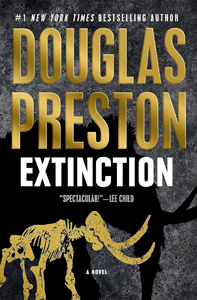Douglas Preston has ended some of his novels in crazy fashion, and he starts “Extinction” (April, hardcover) in crazy fashion on page one. People are observing woolly mammoths frolicking in nature. I wondered: Is this a CGI video? Is this book set in the distant future, when cloning is common?
The new science of de-extinction
This crazy start turns out to be a great start. (SPOILERS ABOUT THE BOOK’S INITIAL PREMISE FOLLOW, BUT NOTHING ABOUT THE LATER TWIST.) Preston does something that’s been done surprisingly little since Michael Crichton’s breakthrough 1990 novel: He riffs on “Jurassic Park,” except with early giant mammals instead of dinosaurs.
Preston has some cheeky fun with the unavoidable “Jurassic Park” comparison. A rich adventurer at the Rocky Mountains nature preserve/resort loves Crichton’s book and Spielberg’s film. Later, we meet a scientist who thinks “JP” is bunk.

“Extinction” (2024)
Author: Douglas Preston
Genres: Science fiction, horror, mystery
Setting: Colorado Rockies, near future
The author successfully has it both ways. “JP’s” science is bunk, because dinosaur DNA has not been found in the real world, and the relative ease with which scientists clone dinosaurs is hand-waving. By switching the premise to early mammals, Preston increases the verisimilitude yet doesn’t decrease the magic all that much. The author notes that the woolly mammoth genome was decoded in 2010 – both in the novel and in the fact-based afterword.
Preston almost taps into Crichton’s knack for making amazing SF concepts seem like they will happen tomorrow. The very fact that I’m comparing this book to “JP” at all is a compliment to “Extinction” (which could’ve been called “De-Extinction”). The deep sense of scientific mystery isn’t quite there, though.
For one thing, Preston makes us understand that these mammals are not dangerous; their violent genes have been removed, and this environment includes no predators. They are peaceful. This is smart by the scientists, and it helps ground the novel. But one path not taken by Preston is showing how giant animals are inherently dangerous, even if they aren’t trying to kill humans.
Mining for thrills
So yes, we get a very Prestonian book rather than something Crichtonian, but that’s nothing to sneeze at when Preston brings his A-game, which he does. He starts “Extinction” similarly to a recent collaboration with Lincoln Child, “Cold Mountain” (2023). Campers disappear – seemingly killed – in a bizarre way. I wonder if this alternate progression of the story popped into his mind while writing “Cold Mountain.”
Colorado Bureau of Investigation agent Cash, a woman, and local sheriff Colcord, a man, are the main investigators; their growing rapport is enjoyable, and it’s mildly daring that neither of them are young and hot. They are approaching middle age and a little overweight, but both are excellent at their jobs. Later, we get those still-amusing Prestonian touches of ass-covering officials, and a swarming mass of media members. Another neat element is a nearby “movie town” constructed from a ghost town, where a big-budget film is being shot.

“Extinction’s” setting is delicious. This posh resort in the Rockies is surrounded by long-since tapped-out gold mines. The scientific complex where the animals are cloned is partly built into the mines, with modern ascetic corridors following the contours of the man-made caves. Steel plates separate the mining tunnels from the complex.
Preston writes thrilling sequences in this setting, and caps the action off in a satisfyingly intellectual, philosophical showdown. While “Extinction” as a whole doesn’t match Crichton’s ability to make a reader excited about mysterious, almost-real, near-future science, Preston edges closer as the events unspool. His afterword – citing the real-world progress of de-extinction – is as good as anything in the fictional part.
Another interesting point: This is only the second Preston novel that’s not (for now) part of an ongoing series. The other is his very first novel, “Jennie” (1994). I strongly suspect we will see more of Cash and Colcord and this de-extincted future, though.

